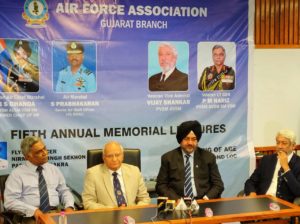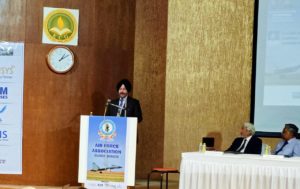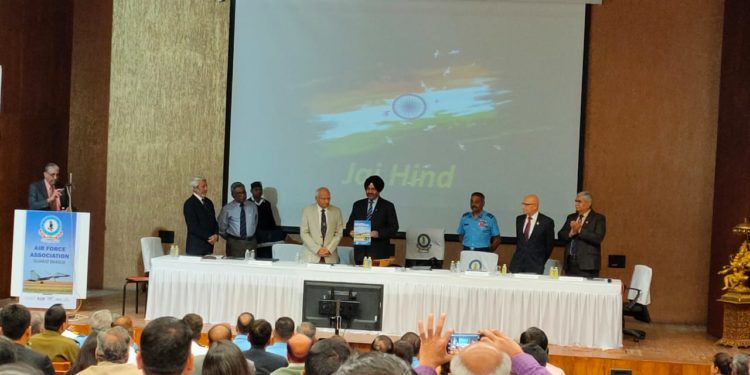NE NEWS SERVICE
AHMEDABAD, FEB 9
Former Air Chief Marshal BS Dhanoa on Sunday said that Pakistan always underestimated India’s preparedness in fighting back. Dhanoa talked about the preparations of the airstrike in Balakot, Pakistan and how it helped India achieve its political goal. Dhanoa also talked about modernization and upgradation of the Indian Air Force (IAF). He also said the Rafale aircraft will be a game-changer as the aircraft are far ahead in terms of missiles and its make.

India has placed orders for 36 Rafale jets with France and the first batch of four planes would start arriving in May this year. Rafale is half a generation ahead of aircraft that are in possession of China and Pakistan.
The former IAF Chief said the results would have been different in the aerial war if we had Rafale fighter jet.
“As the Prime Minister (Narendra Modi) too had earlier said if we had Rafale on 27 (Feb 27), the results would have been different,” he said.
Courtesy: Gujarat Tak
Chief Guest Dhanoa was speaking on ‘IAF In The Changed Security Paradigm’ at the fifth Flying Officer Nirmal Jeet Singh Sekhon PVC annual memorial lecture organised by the Gujarat chapter of the Air Force Association at Knowledge Consortium Auditorium of Gujarat University here. This year the event was dedicated to “IAF- COMING OF AGE – Striking beyond LoC”, the Balakot strike at the terrorist camps. This was one of the rarest of times in which the IAF had flown across the line of control in peacetime

“Though the Indian Air Force has trained itself to fight a full-scale conventional war in a joint campaign with sister services, it has to reorient and retrain itself to the changing paradigm. It must plan and address capability voids in due course of time,” the former Air Chief Marshal said.
Speaking on likely scenarios of the future, the IAF chief (retd) Dhanoa said, “We come to realise that sub-conventional conflict over terrorist attack on one of our installations and personnel has the highest probability of occurrence because it can happen anytime and anywhere. This is something for which we need to be prepared 24/7.”
“A skirmish or a localised conflict like Kargil due to a terrorist attack that has gone awry like Uri and Pulwama are within the realm of possibility of our western neighbour,” he said.

The former IAF chief added that there was a need to “re-prioritise our expenditure based on this changed paradigm”.
“Hence, spending on the integrated perimeter security system of our bases is more important than bemoaning not having a full authorised centre required for a two-front war,” he said.
The former IAF chief also said, “With the induction of Rafale and S-400, the technological asymmetry will once again be restored in our favour. Even if there is going to be a paradigm shift in the way they are going to fight the next war, there is a need to have a technological superiority so that our deterrence remains effective and we can maintain the peace”.
He underlined the needs for a “full-spectrum capability”, as the enemy keeps modernising, and to address some of the “capability voids”.
Stressing that cyber and space were two new domains which have to be defended strongly, the former ACM said, “The way we have a network-enabled force, there are so many systems riding on our communication network, and very shortly deployment of operational data link, we will become a network force.”
“Cyber will have to be defended very strongly. Second is space, initially used only for telecommunication…add a new dimension which has changed the paradigm,” he added.
The former IAF chief said the surgical strike carried out in retaliation to the attack on the Uri base has signalled a paradigm shift in the way Indian government would respond to terrorist attacks involving mass casualties.
“A surgical strike was authorised, and Balakot strike was approved by the government to send a political message to Pakistan that such attacks will incur a heavy price.
“Pakistan government got the message that the new government will respond militarily to major terrorist attacks on its soil… This happened because of decisive national leadership in place, backed by the fact that should it escalate, we are ready for it at short notice. After all, it was a joint battle, and government cannot battle without all the three services being ready,” he said.
Regarding the Balakot strike, the former IAF chief said going after a “non-military target” was “a very wise decision”.
“The operational capability and our intelligence capability cannot be compromised to just try and win the perception battle in the media. But both the Pakistani establishment and (terror group) Jaish-e-Mohammed got the message,” he said.
The former IAF chief further said that there were no major terror attacks between February and June 2019 till the conclusion of the Lok Sabha polls because the Army, Navy and Air Force were “forward-deployed to give a punitive response at very short notice.”
He added that the attack on a terror camp in Pakistan was meant to give a message to that country’s establishment, and “not to the Pakistani public, or an effort to win a propaganda battle with the Pakistani and international media”.
“Had it been so, we would have used different weapons and different modes of attacks for which presently Pakistan has no counter,” he added.
When asked about the shooting down of the Indian Mi17 V5 chopper at Budgam near Srinagar on February 27, 2019, he said, “It was a big mistake on our part. It had happened as the Standard Operational Procedure (SOP) was not followed by some IAF personnel. A Court of Inquiry was instituted and action was taken against those involved in it to avoid recurrence of such mistakes.”
It was just a day after the Indian Air Force (IAF) fighters went deep inside Pakistani territory and bombed a terror camp at Balakot following the terror attack on CRPF convoy killing 40 troopers.
The chopper downing led to the death of six IAF personnel and a civilian.
Former Lt General PM Hariz, in his speech on “Kashmir – The Unfolding Story”, elaborated that the abrogation of Article 370 and restructuring of Jammu and Kashmir into Union Territories has helped contain militancy. Further, now the developmental works undertaken by the Administration have started paying rich dividends.
Veteran Vice Admiral Vijay Shankar, an internationally acclaimed authority on Nuclear and Maritime security, while speaking on “Staring Down the Abyss – Nuclear Security in the Sub-continent” dwelt at length on nuclear cooperation between China and Pakistan and its implications in the sub-continent.









